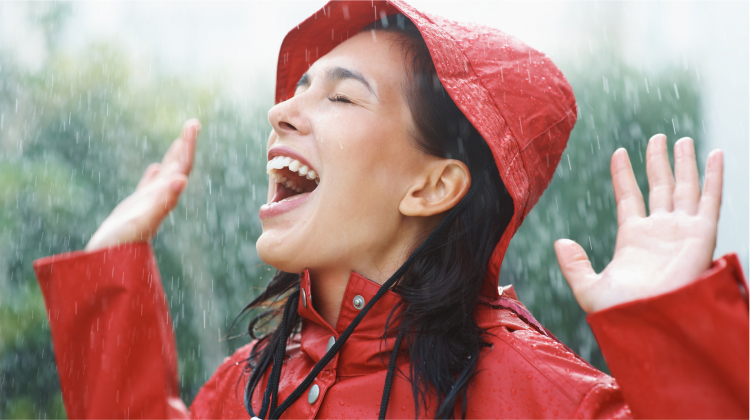
Have you ever wondered whether rainwater is good for your hair? It's a question that comes up quite often, especially for those of us who have been caught in a sudden downpour.
In this article, we'll dive deep into the effects of rainwater on our hair – both the good and the bad. So, let's get started and find out whether rainwater is a hidden treasure for our locks or just another natural element we should be wary of.
Is Rainwater Good for Your Hair?
There's no denying that rainwater has some pretty impressive benefits for your hair. Who knew that something as simple as rain could make such a difference? Let's take a look at some of the positives:
Naturally Soft
Rainwater is naturally soft and lacks minerals such as calcium and magnesium that are commonly found in hard water. This softness makes rainwater easier on hair, helping it retain moisture, improving manageability, and allowing for better absorption of hair products.
Additionally, rainwater is free of chlorine, which can strip hair of its natural oils and leave it dry and brittle. The lack of minerals in rainwater also means that it doesn't leave behind any mineral buildup on the hair or scalp, which can lead to dullness and irritation.

Neutral pH
With a pH of around 5.6(1), rainwater is pretty close to the ideal pH level for hair (4.5 to 5.5). This neutral pH helps close hair cuticles, reducing frizz and preventing damage. Moreover, a neutral pH can contribute to better moisture retention in the hair shaft, promoting elasticity and reducing breakage.
Free of Chemicals
Unlike tap water, rainwater isn't treated with chemicals such as chlorine and fluoride. These chemicals can be harsh on your hair and scalp, causing dryness and irritation. Chlorine, in particular, can strip hair of its natural oils, causing it to become brittle and prone to breakage. Rainwater offers a more natural alternative that can be gentler on your locks.
Remove Product Buildup
Rainwater can help remove product buildup from your hair, leading to less dullness and weighed-down tresses. A good rinse with rainwater can give you a thorough cleanse without the need for harsh shampoos or clarifying treatments.
Promote Hair Growth
Rainwater is rich in essential nutrients and minerals that can stimulate hair growth. It contains nitrates, which are compounds that nourish your hair and scalp, potentially leading to increased hair growth.
Antibacterial and Antifungal Properties
Rainwater has antibacterial and antifungal properties, which can help maintain a healthy scalp by keeping bacteria and fungi in check. A healthy scalp is crucial for overall hair health and growth.

Increase Shine
Thanks to its ability to close hair cuticles, rainwater can make your hair look shinier and more vibrant. When hair cuticles are closed, they lie flat, allowing light to reflect off the hair strands more effectively, creating a shinier appearance.
Maintain Natural Oils
Since rainwater is free of harsh chemicals, it can help maintain your hair's natural oils. These oils, also known as sebum, are produced by the sebaceous glands in your scalp and are vital for maintaining hair health. Natural oils work as a protective barrier, locking in moisture and preventing hair strands from becoming dry and brittle.
Soothe an Irritated Scalp
Rainwater can be gentle on your scalp, soothing irritation, and inflammation. Its neutral pH, lack of harsh chemicals, and potential antibacterial properties can contribute to a healthier scalp environment.
So, it seems like there are quite a few reasons to believe that rainwater can indeed be good for your hair. But before you start dancing in the rain, let's explore the other side of the story.
Is Rainwater Bad for Your Hair?

As with most things in life, there's a flip side to the coin. While rainwater has some great benefits for your hair, it's not all sunshine and rainbows (pun intended). Let's take a look at some potential drawbacks and concerns:
Polluted Rainwater
Depending on the location and environmental factors, rainwater can contain pollutants like dust, dirt, and chemicals(2). These contaminants can be harmful to your hair and scalp, causing dryness, irritation, and even damage. If you choose to use rainwater, it's essential to filter and purify it before use.
Rainwater Acidity May Vary
While rainwater generally has a neutral pH, it can become more acidic due to pollution and other environmental factors. Acid rain can be damaging to your hair, leading to dryness, brittleness, and breakage. It is important to test the pH level of collected rainwater and adjust it if necessary to ensure it falls within the ideal range.
Rainwater Alone May Not Be Enough
While rainwater can provide some benefits to your hair, it is not a complete hair care solution. You still need to use appropriate hair products and follow a regular hair care routine to keep your hair healthy and well-maintained.
Wet Hair Is More Vulnerable
When your hair is wet, it becomes more susceptible to damage and breakage. If you get caught in the rain, it is essential to gently dry your hair and avoid any harsh combing or brushing until your hair is no longer wet.
Humidity and Hair Frizz
High humidity levels, which are common during rainy weather, can lead to hair frizz. This is because the hair absorbs moisture from the air, causing the hair shaft to swell and the cuticle to lift. This results in frizzy, unmanageable hair.
Rainwater and Hair Color
Rainwater can potentially affect hair color, especially in dyed or chemically treated hair. This is because rainwater may contain trace amounts of minerals, pollutants, and other substances that could react with the hair dye, causing the color to fade or change.
Rainwater and Dandruff
Rainwater may help to alleviate dandruff issues due to its potential antifungal properties. Dandruff is often caused by an overgrowth of yeast on the scalp, and the antifungal properties of rainwater may help to keep this issue in check.
When collecting rainwater, it is essential to ensure that the collection area is clean and free from contaminants. Using a clean, non-toxic container and a filtration system can help to ensure that the collected rainwater is safe for use on your hair.
Final Thought
So, is rainwater good for your hair? Well, it's a bit of a mixed bag. Rainwater can indeed provide many benefits for your hair, but it's essential to take proper precautions, such as filtering and purifying the water, testing its pH level, and maintaining a proper hair care routine.
Additionally, it's important to handle wet hair gently to prevent damage. So, the next time you're caught in the rain, remember that while it might not be a perfect hair care solution, rainwater does have some hidden treasures for your locks – as long as you're mindful of its potential drawbacks.
Frequently Asked Questions
Is rain good for your hair?
The effects of rainwater on hair can be both beneficial and negative. Rainwater offers advantages like natural softness, neutral pH, and chemical-free composition. Yet, it may also contain pollutants or vary in acidity. Taking precautions is essential.
Does rain water make your hair grow?
Rainwater, enriched with vital nutrients and minerals such as nitrates, can provide nourishment to hair and scalp, potentially promoting hair growth. However, it isn't a guaranteed solution for enhancing hair growth.
Does rainwater cause hair loss?
Directly, rainwater doesn't cause hair loss. However, polluted or acidic rainwater might lead to scalp irritation and hair damage, potentially resulting in hair loss. Filtering and purifying rainwater prior to use helps reduce these risks.
Does rain water make your hair greasy?
Contrary to making hair greasy, rainwater can help eliminate product buildup, minimizing dullness and heaviness. Nonetheless, maintaining a proper hair care routine is necessary to regulate oil production and ensure hair health.
Is rain water good for black hair?
Rainwater can benefit black hair with its soft nature, neutral pH, and chemical-free properties. It assists in preserving natural oils, stimulating hair growth, and soothing irritated scalps. However, it's crucial to use clean and safe rainwater by taking appropriate precautions.
References
1. Carroll, D. (1971). Rainwater as a chemical agent of geologic processes - A review. American Journal of Science, 271(2), pp. 105-122. Available at: https://pubs.usgs.gov/wsp/1535g/report.pdf.
2. Anon, (2023). Rainwater Collection. {online} Available at: https://www.cdc.gov/healthywater/drinking/private/rainwater-collection.htm.

.jpg)
.jpg)
.jpg)
.jpg)
.jpg)
.jpg)
.jpg)
.jpg)
.jpg)
.jpg)